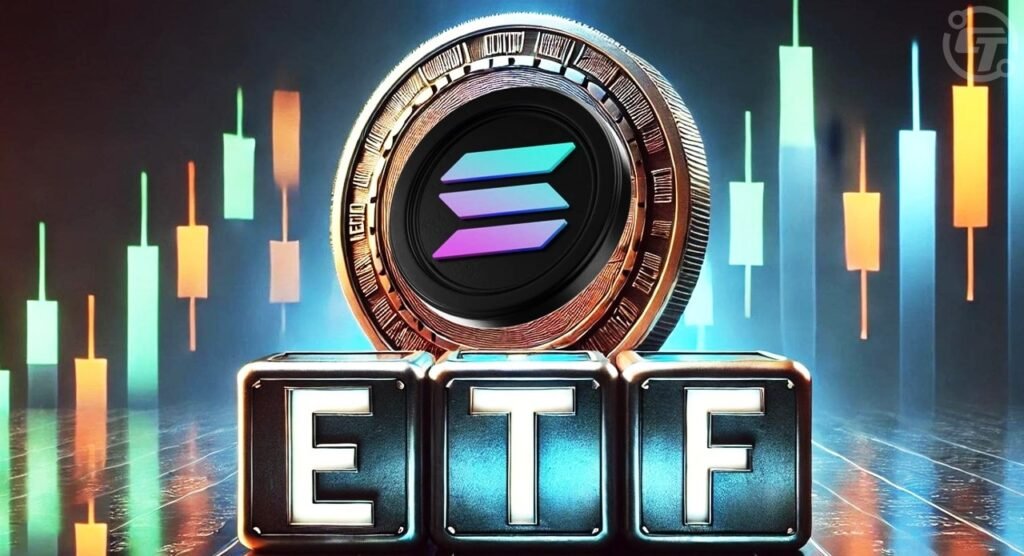Introduction: The Next Big Crypto ETF Battle Begins
The world of bitcoin ETFs is changing quickly, and Solana (SOL) is the next big player in institutional investing. Seven big asset managers have now filed for spot Solana ETFs after the historic approvals of spot Bitcoin and Ethereum ETFs earlier this year. This shows that institutions are becoming more confident in the high-speed blockchain.
Experts in the field, on the other hand, say that Solana’s journey to ETF certification will have a lot more regulatory problems than its predecessors. The SEC has always been sceptical of cryptocurrencies, and since Solana’s securities categorisation is still up in the air, this might turn into a long fight with an unclear end.

We’ll look at the following in this in-depth study:
- The seven biggest companies that are spearheading the Solana ETF drive
- The main problems with regulations that are in the way
- Possible time frames and effects on the market
- What both the approval and denial scenarios could entail for SOL investors
Section 1: The Contenders – Who’s Betting Big on Solana ETFs?
Some of the biggest brands in financial management are competing to launch the first Solana ETF. Here is a full look at each applicant:
1. VanEck (First Mover – filed on June 27, 2024)
The company that helped create the Bitcoin ETF wave is now in charge of the Solana ETF competition. VanEck’s filing puts them in the lead because they have experience with crypto ETFs.
2. 21Shares and ARK Invest (Filing Together)
This strong cooperation brings together ARK Invest’s revolutionary ETF methodology and 21Shares’ knowledge of cryptocurrencies. Their joint filing shows that there is a lot of institutional interest in SOL exposure.
3. Greyscale (Plan for Converting the Solana Trust)
Greyscale wants to do the same thing with its Solana Trust now that it has successfully turned its GBTC Bitcoin trust into an ETF. This could provide Greyscale investors a more liquid choice.
4. Bitwise
Bitwise is known for its studies on cryptocurrencies and its existing Bitcoin ETF. This gives them a lot of market expertise for its Solana ETF bid.
5. Invesco and Galaxy Digital
This strategic partnership brings together Galaxy’s crypto-native knowledge with Invesco’s $1.6 trillion in assets under management.
6. Valkyrie
The company that established one of the first Bitcoin ETFs is now looking to add Solana to its list of crypto ETFs.
7. WisdomTree
WisdomTree wants to offer its Solana product to the U.S. market because there are currently a lot of crypto ETPs in Europe.
Section 2: The Regulatory Minefield – Why Solana Faces Tougher Odds
Even if the rush of filings is good for Solana’s long-term future, there are still some big problems that need to be solved before it can be approved:
1. The Question of How to Classify Securities
The SEC has said many times that SOL might be a security, especially in its actions against Coinbase and Binance. This makes things very unpredictable, which wasn’t the case with Bitcoin ETFs.

1. Main Concern:
- It was evident that Bitcoin was a commodity.
- Ethereum’s status was unclear, but it was finally accepted.
- Solana starts off in a more risky regulatory situation
2. No regulated futures market
The SEC approved spot Bitcoin ETFs once CME Bitcoin futures were set up, which gave
- Ways to find the right price
- Agreements to share surveillance
- Set up regulatory oversight
- These important parts are not yet in Solana, which makes it much harder for the SEC to approve it.
3. The political and regulatory climate
The political climate is still tough because SEC Chair Gary Gensler is typically against most cryptocurrencies other than Bitcoin. The forthcoming U.S. election could change this dynamic, but it’s hard to say when.
Section 3: Potential Timelines and Scenarios
Best Case Scenario: Approval
Launch in late 2025 or early 2026 if:
- SOL doesn’t get called a security
- A regulated market for futures comes into being
- The political winds change for the better.
The worst-case scenario is rejection.
The SEC says no to all applications because:
- Breaking the law on securities
- Not enough market oversight
- Concerns about protecting investors
Most Likely Result
- Longer review procedure (12 to 18 months)
- Possibility of partial permissions with stringent rules
- Possible legal fights like the one Greyscale had over its Bitcoin ETF
Section 4: Market Implications – What Approval or Rejection Would Mean

If Accepted
- ✅ Open institutional floodgates—this might bring in billions of more dollars.
- ✅ Price surge potential—SOL could challenge its $260 ATH.
- ✅ Altcoin Domino Effect: Cardano and XRP ETFs could follow.
If Not Accepted:
- ⚠️ Short-Term Price Pressure – News may cause a sell-off
- ⚠️ Continued Regulatory Uncertainty – This could make it harder for institutions to get involved
- ⚠️ Focus Shifts to Overseas Markets – Europe and Asia may lead in SOL goods
In Conclusion, It’s a Marathon, Not a Sprint.
The Solana ETF submissions are a big step forward for the use of cryptocurrencies, but investors should be ready for a long and maybe difficult clearance process. In the next few months, we will probably see:
- A lot of SEC scrutiny
- Possible legal problems
- Ongoing political discussion
The most important thing for SOL holders to remember is that Solana’s worth goes beyond just ETF speculation. Its increasing developer activity, institutional adoption, and technological advantages point to strong fundamentals, no matter what happens with the ETF.
What do you think will happen? would there be a Solana ETF by 2025, or would it have to go through a lot of regulatory fights?


















